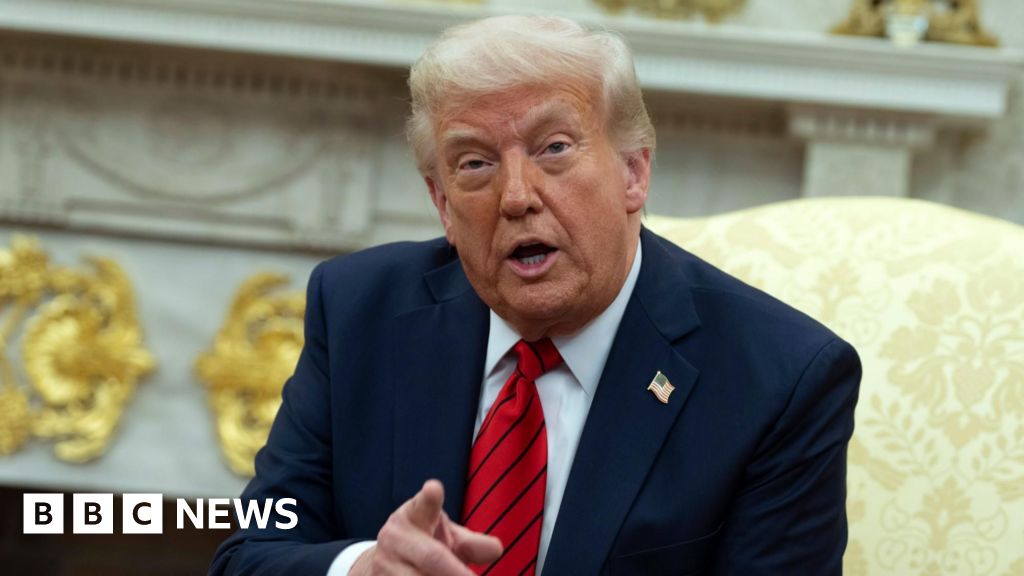Understanding the Implications of the 2024 US Election for Mexico and Beyond

As the 2024 US election approaches, the relationship between the United States and Mexico has seen a remarkable shift, especially in light of the previous tensions surrounding drug cartels and U.S. tariffs. After months of threats from the Trump administration to impose tariffs on Mexican goods due to what they termed an intolerable alliance with drug trafficking organizations, there has been a surprising pivot towards a more collaborative stance.
President Donald Trump has publicly commended President Claudia Sheinbaum of Mexico, referring to her as a wonderful woman for her efforts in combating the smuggling of fentanyl into the United States. This positive reinforcement has extended to other officials, including Homeland Security Secretary Kristi Noem, who described Sheinbaum as remarkable. Notably, even one of Mexicos most vocal critics in the U.S. Congress remarked on the newfound cooperative spirit, stating that the Mexican government is now willing partners in addressing security concerns for the first time in many years.
Previously, Trump sought to compel Mexico to take action against drug cartels by designating several of these organizations as terrorist entities and threatening a hefty 25% tariff on certain exports. However, Sheinbaum, who was sworn in shortly before Trumps electoral victory, utilized her initial momentum to begin reforming Mexicos security approach well before Trump officially took office. Remarkably, she has navigated this transition without criticizing her predecessor, Andrs Manuel Lpez Obrador, who championed a hugs not bullets strategy and maintained minimal collaboration with the U.S.
Instead of continuing Lpez Obradors relatively hands-off approach, Sheinbaum has opted for a more aggressive stance against drug cartels, focusing on revitalizing police forces and directly confronting the issues of organized crime. The stakes in this new strategy are incredibly high: during Lpez Obrador's six-year tenure, around 200,000 Mexicans were murdered, and an estimated 50,000 individuals went missing, marking a significant escalation in violence compared to previous administrations. Concurrently, the United States has grappled with a staggering rise in overdose deaths fueled primarily by fentanyl, much of which is trafficked through Mexico.
In her first 100 days in office, Sheinbaums administration reportedly confiscated arms at a rate over 100 times greater than that of Lpez Obradors administration during the same period, and drug seizures were reported to be 2,000 times higher based on estimates. After six months, Sheinbaum's government appeared to have apprehended more alleged members of organized crime than Lpez Obrador had during his entire presidency.
The new security strategy is markedly different; its far more confrontational, noted Lila Abed, the director of the Mexico Institute at the Wilson Center in Washington, D.C. The Mexican government has been forced to respond rapidly to the expectations set forth by the White House.
Sheinbaums commitment to cooperating with the Trump administration was evident early on; within weeks of his inauguration, she delivered the largest group of wanted drug traffickers ever sent to the U.S., circumventing standard extradition processes. This included 29 suspected narcos, one of whom had been a target for over four decades.
In response to this intensified collaboration, security leaders from both nations have made reciprocal visits to each others capitals, and U.S. surveillance drone flights over Mexico have reportedly increased. Mexican authorities have acknowledged that American intelligence has played a pivotal role in recent cartel arrests.
The push for a revamped security policy in Mexico has been spearheaded by Sheinbaums security chief, Omar Garca Harfuch, who has become emblematic of the countrys strategic shift. Unlike Lpez Obrador, who opted for a militarized approach while sidelining police forces, Sheinbaum has supported Harfuch, an ex-police officer who famously survived a cartel assassination attempt. She has also enacted legislation to enhance his investigative authority and is in the process of assembling a new elite federal police force to replace the one dismantled by Lpez Obrador.
According to Eduardo Guerrero, a security analyst, The contrast in expertise is enormous. We have transitioned from a state of amateurism to one led by professionals in security. Initial signs indicate that this new approach may be yielding positive results; homicides fell by nearly 15% in Sheinbaums first six months, alongside a reduction in various other crimes.
Nevertheless, despite these encouraging trends, disappearances remain alarmingly frequent, and violence continues to plague significant portions of the country. In regions such as Sinaloa, where rival cartels are embroiled in brutal conflicts, families are terrified to send their children to school, and corpses are regularly discovered in public spaces.
Some analysts are concerned that prioritizing U.S. security interests may detract from addressing Mexico's internal challenges. Although public opinion polls indicate that Mexicans are largely supportive of Sheinbaum, they continue to identify insecurity as the nations most pressing issue.
Numerous conflict zones across the country require immediate attention to prevent them from spiraling further out of control, remarked Falko Ernst, a security expert based in Mexico City.
Despite the challenges, the Mexican government asserts that its recent interventions are beginning to yield results in high-crime areas such as Guanajuato, Mexicos leading auto-producing state, which has also been dubbed the most dangerous. Sheinbaum claims that arrests of particularly violent criminals in this region have contributed to early signs of a decrease in homicide rates.
However, security experts caution that true control will not be regained without substantial resources and comprehensive reforms to address corruption, moving beyond mere arrest statistics and drug confiscations.
Recent critiques have suggested that the government is focusing too much on appeasing U.S. interests, engaging in a public relations game that seeks to minimize media coverage of ongoing violence while emphasizing arrest numbers and drug busts. Whether this represents a genuine shift in strategy is open to question, Ernst remarked.
Sheinbaum is currently contending with the largest fiscal deficit Mexico has faced since the 1980s, leading her to implement double-digit cuts to the security budget. This financial strain means that Garca Harfuch must navigate operations with limited support from the historically opaque military and financially strained local governments that often struggle with corruption.
For the moment, these efforts may be effectively staving off Trumps more aggressive tendencies toward Mexico. Nevertheless, while Sheinbaum has largely avoided backlash for bypassing extradition protocols, her leftist government may find it challenging to withstand one particular U.S. threat: drone strikes targeting cartels within Mexican territory. Although officially unconfirmed by the White House, reports from sources like NBC indicate that this tactic is under serious consideration.
The U.S. has expressed satisfaction or at least acknowledged Mexicos recent security achievements, stated Abed. However, whether this will suffice to ease Trumps more confrontational policies towards Mexico remains to be seen.




























